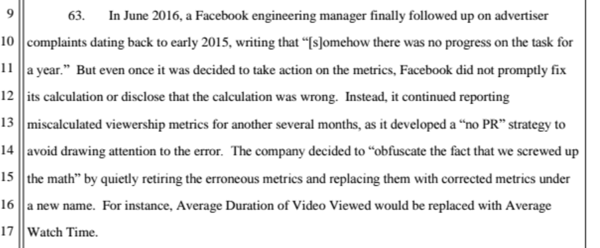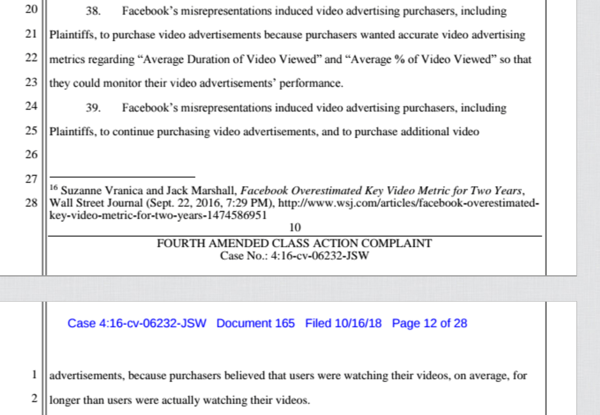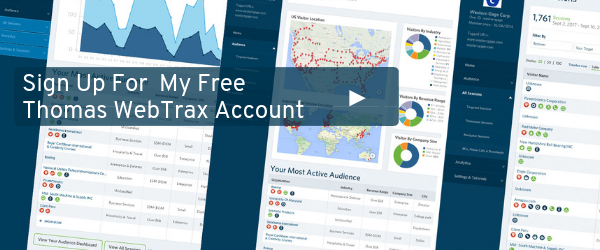Did Facebook Dupe Advertisers With Fake Video Metrics?
Jay Scheer October 19, 2018
These days, video is the predominant form of content on the web. It’s a fact that has shaped newsrooms, business strategies, and marketing budgets.
But is video’s digital dominance built, at least somewhat, on a big lie?
 That’s the essence of a new class action lawsuit filed against Facebook on Tuesday. The suit, brought forth by a group of advertisers, alleges that the social media giant substantially overstated metrics related to videos on the network, and that the company knew about the discrepancies for more than a year but did nothing to correct it.
That’s the essence of a new class action lawsuit filed against Facebook on Tuesday. The suit, brought forth by a group of advertisers, alleges that the social media giant substantially overstated metrics related to videos on the network, and that the company knew about the discrepancies for more than a year but did nothing to correct it.
The issue of inflated video data first popped up in September 2016, when a Wall Street Journal article reported that Facebook “vastly overestimated average viewing time for video ads on its platform for two years” by as much as 60 to 80 percent. Facebook issued a statement in response saying that “As soon as we discovered the discrepancy, we fixed it.”

However, according to the new suit, a review of more than 80,000 pages of internal Facebook documents revealed that this was not the case. The plaintiff's claim that the metrics were off by 150 to 900 percent. Even more alarming, the lawsuit alleges that Facebook waited more than a year to make corrections and, when they did revise the numbers, they did so deceptively.

Impact On Industrial Marketers
Video advertising has become one of Facebook's most lucrative streams of income. As the purported reach and power of Facebook's video ads grew exponentially in the last three years, marketers began shifting more resources — time, money, personnel — into creating videos for the platform and advertising those videos.
However, if the allegations of the lawsuit prove to be true, it's likely that many marketing decisions have been made on false pretense, possibly at the expense of other more successful channels and networks.

What Now?
Should you abandon video marketing altogether? Absolutely not. It's still one of the best ways to tell your story, showcase your content, and forge connections with potential new customers. However, if you are conducting any paid advertising campaigns on Facebook — or other social networks and ad platforms — you should always be examining your results to ascertain how these tactics are influencing your ability to attract new buyers and generate leads. If you are not seeing a return on investment, you may want to reallocate that budget to more targeted industrial PPC efforts.
Whatever the outcome of the lawsuit, it underscores how essential it is for marketers to have access to accurate and actionable metrics. Without it, it can be difficult to properly plan, strategize, and budget for successful campaigns.
Did you find this useful?






.jpg)


